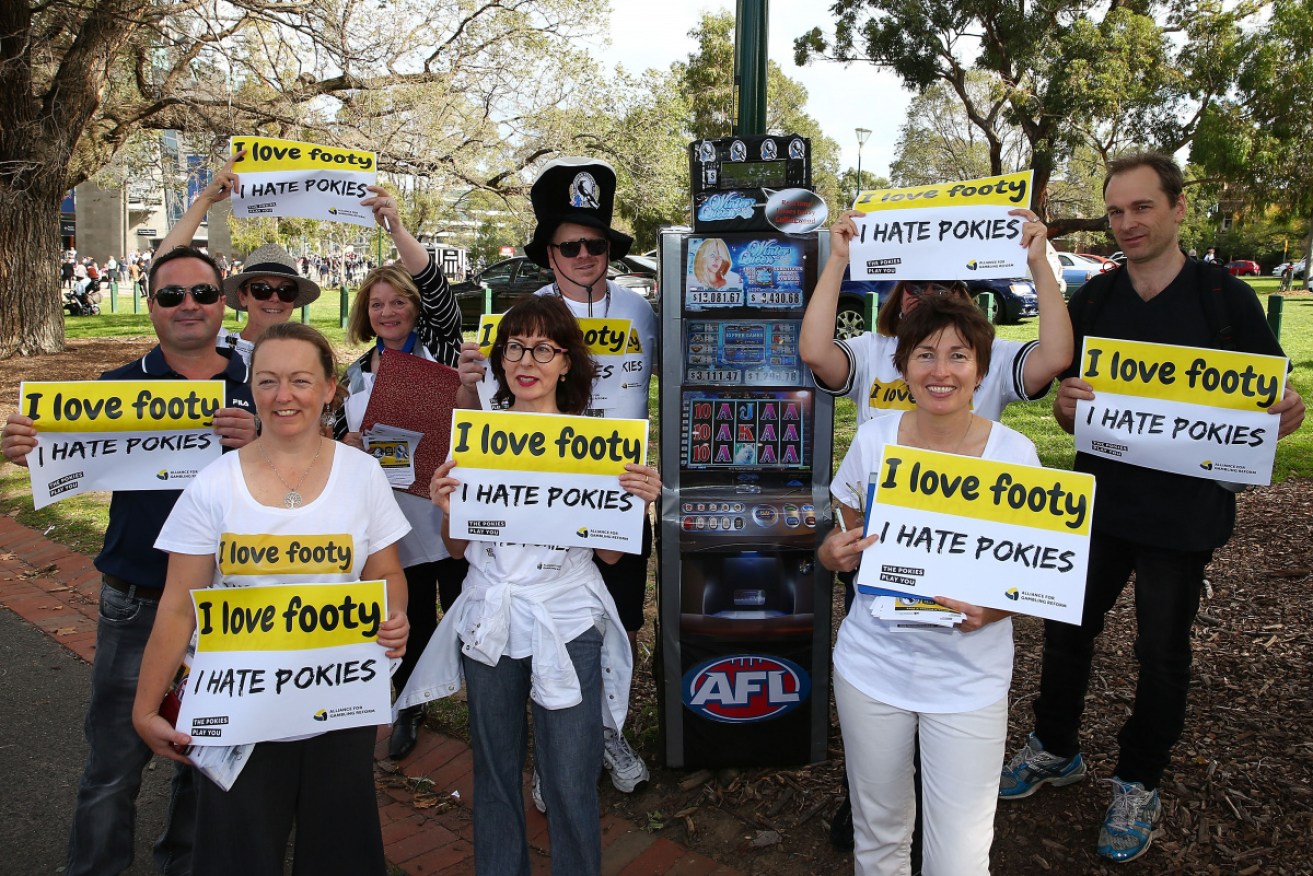Financial own goals in pandemic could remake sport


Anti-pokies protesters outside an AFL football match. Photo: Getty
There is a school of thought that has some Australians arguing that sport is really of no intrinsic value to society.
These people will admit exercise and keeping fit is important, but are mystified at their colleagues who gather around the tea room or lunch box to dissect sport in all its myriad incarnations.
To some, these physical contests are disposable – the first thing to go in a crisis and the last thing that should demand attention when society is being challenged.
The flip side is that our competitive sports events – be they personal, team or as a spectator – bind and connect us in ways that are hard to quantify but are integral to community spirit, social frisson and joy.
We will soon find out just how dispensable, or otherwise, sport is as a social balm as we struggle through months of grief and anxiety without the roar of any crowd.
But when the virus is defeated, sport may well have to answer fundamental questions about its obfuscation, priorities and financial stability in this time of strife.
For the past two weeks the football codes have turned themselves inside out to preserve their revenue streams while justifying their decision to play on after taking health advice on player welfare.
The result was games played in close contact when most world sports had shut down and broader medical advice emphasised social distancing.
Self-isolation for the players, however, did not necessarily mean safety for the fans, as people still turned up outside grounds and crowded into pubs and clubs to watch matches.

Engage the community: Raiders fans at the NRL grand final. Photo: Getty
Formula One had the toughest task, being the first to reach too far and fail as the Australian Grand Prix at Albert Park fell apart in chaos, with crowds packed together outside closed gates.
The poor timing should have been a warning about the social and reputational cost of business as usual.
Cricket Australia took the lead and cancelled its one-day Trans Tasman series after one match – no doubt comforted by the fact it had squeaked through to the keeper an 86,000 Women’s T20 World Cup MCG crowd just days before.
But the football codes were determined to start their seasons in whatever form they could manage.
Officials seemed to fear not only the demise of vital television revenue, but also the risk of breaking the spell that footy has over us.
For 30 years it has become clear professional sport has been distorted by its addiction to ever-bigger slices of entertainment’s financial pie.
This crisis may finally focus attention on what really matters, such as how sporting clubs shape and enhance our community.
Perhaps the break will allow sport to reset its priorities.
For our football codes – not unlike many households budgets now under pressure – have been living above their means.
In laying off 80 per cent of its staff on Monday the AFL offered a message of care for those affected, but there seems no denying the sport has become bloated with expensive suits, bulging football departments and elite development pathways.
No football until May 31 apparently means that most of what it does is not sustainable – and it’s not because so much cash has been tipped into grassroots footy, community facilities or even a heartland like Tasmania.
The NRL also appears to have been living hand to mouth, putting out the begging bowl to government when it became clear the season was in doubt.

The AFL grand final is a money spinner, but where’s the rainy day money? Photo: ABC
Reminiscent of the major banks in the global financial crisis, ARL chief commissioner Peter V’landys seemed to argue the NRL was too big to fail, having not put enough aside for a rainy day.
With the demise of two months of football there’s apparently nothing left up the spout for the AFL and NRL to weather the storm, despite years of dubious gambling and beer sponsorships and ‘community’ clubs that offer little more than poker machines and big-screen TVs.
The A-League, troubled at the best of times, is also set to compress or abandon its season on Tuesday.
When the games do resume, the lunchroom talks will be on again in earnest, but hopefully there’ll be more than just strained hamstrings and tribal niggle on the agenda.
We can only hope that fans demand more for the money they put into sport, so that as not-for-profit entities their clubs enrich the community with more than elite pathways and easier ways to gamble.
In Nick Hornby’s legendary book Fever Pitch about football fandom in all its glory and heartbreak, the English author wrote about how his club Arsenal shaped him from child to man.
“I used to believe, although I don’t now, that growing and growing up are analogous, that both are inevitable and uncontrollable processes,” Hornby wrote.
“Now it seems to me that growing up is governed by the will, that one can choose to become an adult, but only at given moments.
“These moments come along fairly infrequently – during crises in relationships, for example, or when one has been given the chance to start afresh somewhere – and one can ignore them or seize them.”
Our major football codes and clubs have spent three decades striving to become bigger and more influential in business as the dollars rolled in – perhaps, now, it’s time for them to just grow up.








